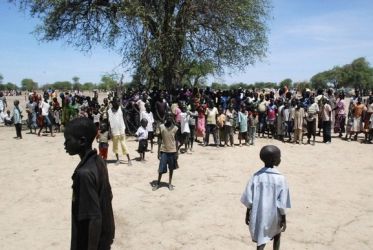S. Sudan accuses Sudan of unilaterally creating Abyei humanitarian commission
January 12, 2013 (WAU) – South Sudan on Friday objected to the formation of a humanitarian commission for the disputed region of Abyei, describing it “a unilateral decision” by the government of Sudan with which it contests ownership of the oil-producing area.

In June of the same year the two parties sealed a deal providing to establish a temporary administration and legislative council but Juba’s objection to appoint a Misseriya at the head of the local parliament delayed the process.
However president Salva Kiir, after accepting the African Union proposal last September accepted gave the green light for the implementation of the deal and renewed his commitment on a meeting held with his Sudanese counterpart Omer Al-Bashir on 5 January.
On Friday, South Sudan’s co-chair of Abyei Joint Oversight Committee (AJOC) Luka Biong Deng accused Sudan of attempting to unilaterally establish “their own Abyei Commission for Humanitarian Affairs”.
Luka Biong said that Khartoum had sent “a delegation to Abyei without coordinating with the government of South Sudan and even within the AJOC.”
He further repeated South Sudan’s assertion over recent days that Sudan was trying to settle Misseriya in Abyei “so that they can dilute and obstruct the referendum” planned for October.
“All these are not good indications for building trust between the two countries and for having an effective administration that can help in maintaining peace and stability,” Deng told Sudan Tribune.
Despite being in contact with Al-Khair Al-Fahim, the Sudanese co-chair of the Abyei Joint Oversight Committee, Deng said that he had little information about the apparent attempt by Khartoum to establish a Humanitarian affairs body in Abyei.
Deng said he had expected that Abyei’s administration would reflect the structure laid out in the proposal by the African Union High-Level Implementation Panel in September on the final status of the area.
“People have expressed fears of more mistrust and tension if the area administration is formed without clarity on the final status. They want an administration that will oversee the conduct of the referendum. The formation of this administration or any department must be agreed by the two parties”, he said.
He accused Sudan of taking “unilateral actions” which violates the AU’s September proposal, which tries to address decades-long conflict over the area.
The African Union mediation convened the two parties to meet on Saturday 12 January to discuss the establishment of Abyei administrative bodies. Prsidents Bashir and Kiir are to meet later this year to discuss the final status of Abyei.
In May 2011, ahead of South Sudan’s secession in July of the same year, the Sudanese Armed Forces took control of the area.
The status of Abyei was to have been decided in a referendum in January 2011 that year but the two sides could not agree on the participation of Misseriya nomads in the vote.
The latest African Union proposal on the matter suggests a vote in October 2013 that would not include members of the Misseriya because they do not reside permanently in the area. Khartoum rejected this proposal which is in accord with the position of the south Sudanese government.
Arop Madut Arop, a member of parliament representing Abyei at South Sudan’s Juba-based National Legislative Assembly, described the Sudanese government as “difficult and elusive” in comments on South Sudan TV on Friday.
Sudan’s ruling National Congress Party, he said, has a history of not respecting agreements on Abyei.
Khartoum, following the signing of the 2005 peace deal, rejected the findings of the Abyei Boundary Commission and resorted with Juba to the the Permanent Court of Arbitration which defined the territory of the disputed area.
(ST)
